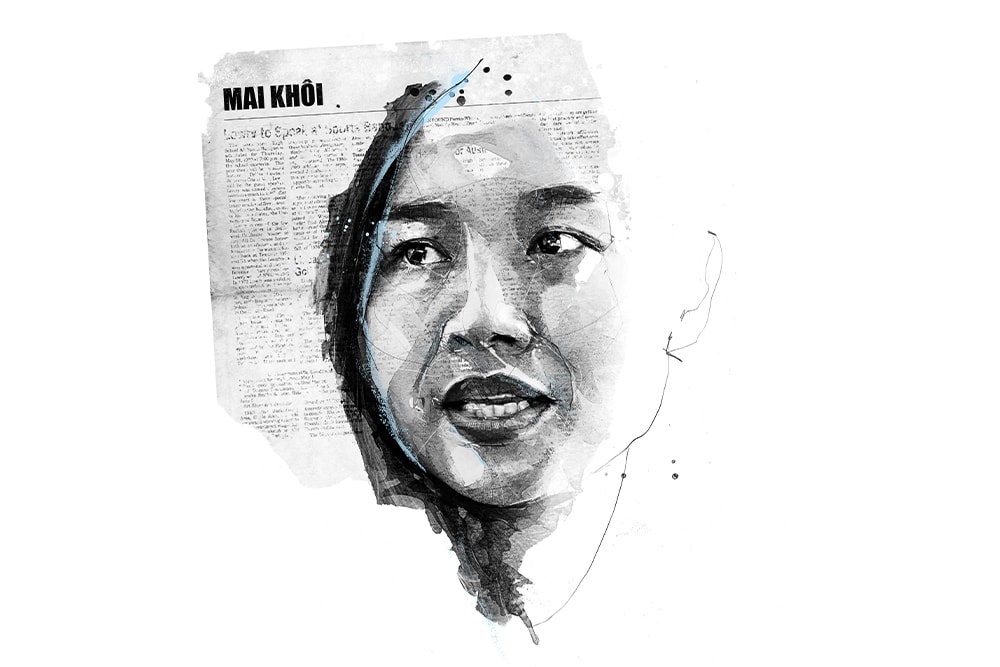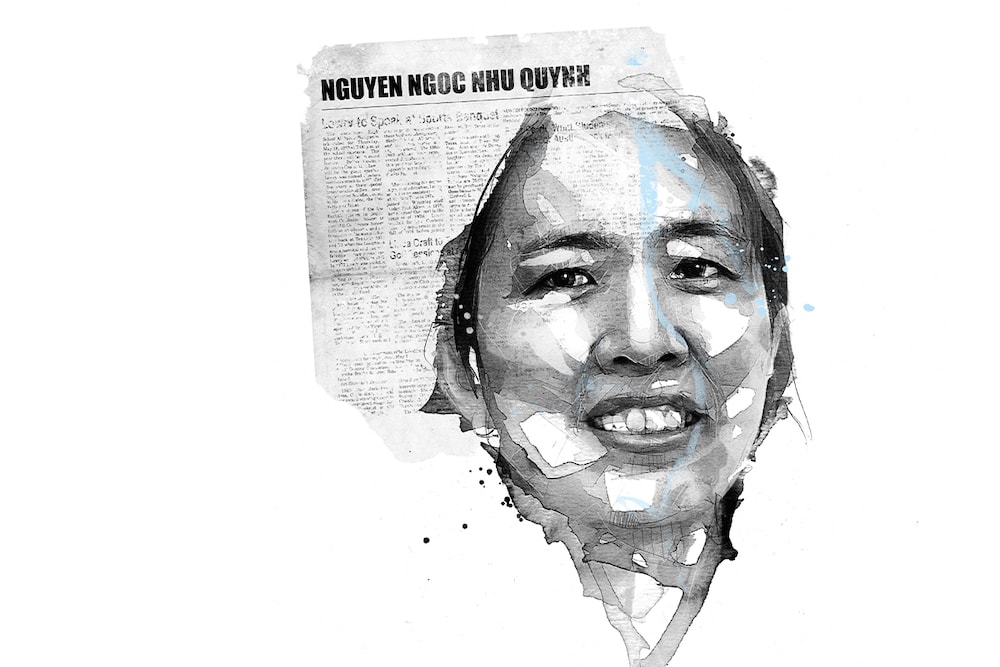A musician known early in her career for her eccentric lifestyle, unusual fashion, and controversial songs, Mai Khôi was described as Vietnam’s “Lady Gaga.” She uses her platform to promote the rights of women and LGBTQI+ communities, and to protest the country’s strict control over artistic expression.
“I want to practice the right of free expression in Việtnam, rather than just talk about the need for freedom of expression.”
In 2010, singer Mai Khôi won Vietnam Television’s song and album of the year award. She celebrated unconventionally, by shaving part of her hair, forming the letters “VN” (Vietnam). This patriotic gesture, however, was frowned on by some conservatives.
This talented and defiant individual, already hugely popular in the country, has continued to risk the ire of authorities while gaining more fans for speaking out about women’s issues, environmental protection, and LGBTQI+ rights.
As her musical career developed over the years, she expressed dismay over the censorship system that restricted artistic expression.
“I began to write about the feelings of artists and people who have to work under the censorship system. People don’t feel free when their work is censored,” she told the Washington Post in 2018.
Authorities were strictly controlling the creative sector. “There is no such thing as freedom of expression here, not in any meaningful sense, anyway. You can’t sing and play your guitar on the street or organize a private show in your own house without having to first ask for permission,” she said in a report by USA Today.
In 2016, she tried to run as an independent candidate in the Communist-controlled National Assembly, but her application was quickly rejected.
“When I nominated myself I just wanted people to know about their right to participate in politics. And I want to be a voice for change, for freedom of expression, for artistic freedom,” she said.
She may have lost her bid to get elected, but she succeeded in sparking a national debate about democracy (or the lack of it) in Việtnam. Her surprise candidacy also grabbed global headlines. Two months later, she joined a small group of activists who met with then-US president Barack Obama to discuss the state of human rights in her country.
Afterwards, she was evicted from her home, and her shows were raided by the police.
In November 2017, she raised a protest banner with the words “Peace on you Trump” – but with the word “Peace” crossed out and replaced with “Piss” – while the then-US president’s motorcade was passing through Hanoi. Trump was in Việtnam for the annual summit of the Asia Pacific Economic Cooperation.
She was again evicted from her home, and hid from the police for 13 days while looking for a new place to stay.
In an interview with IFEX after her eviction, she explained why she had staged the solo protest. “I want to practice the right of free expression in Việtnam, rather than just talk about the need for freedom of expression. Through a little protest and the violent reactions of the authorities, I showed the world that Việtnam does not have freedom of expression. My protest also is a way of resistance against social norms that restrict freedom of expression.”
Mai Khôi later formed a new band – The Dissidents – with Nguyen Duc Minh and Quyen Thien Dac. Their album “Dissent” contained songs which they didn’t submit to the censorship board for review. The music blended jazz and ethnic sounds; a change from the modern pop genre that had catapulted Mai Khôi to stardom. She attributed the change to her political awakening.
“When the topic of my songs changes, I need to change my style as well. Say I’m writing a song about a protest I just witnessed; I can’t express all of my feelings through pop music, I have to use these harsh, raucous sounds to depict that experience,” she told writer Hoa P. Nguyen, in an interview.
Mai Khôi’s creative expression diversified as well. Her Bamboom! project explores eastern philosophy through the use of bamboo-based musical instruments. She also worked on Seaphony, an orchestra comprised of ethnic minority musicians across Southeast Asia.
But she continued to face nonstop surveillance and state harassment. Following her European tour in March 2018, Mai Khôi was stopped at the airport in Hanoi and interrogated by police for eight hours. Copies of her musical album “Dissent” were confiscated. Authorities tried to undermine her career by preventing TV performances and media interviews. In an interview with Freemuse, an international non-governmental organisation that advocates for freedom of artistic expression and cultural diversity, she described her predicament: “I’m not officially banned from singing, but no one will have me because they are scared it will cause them problems […] It’s like they don’t kill me but don’t let me live.”
Unable to publicly perform without risking police intimidation, Mai Khôi turned to social media to broadcast her shows. She acknowledged the importance of Facebook in promoting her work as a musician. But like other activists who initially saw the platform’s potential for free speech, Mai Khoi became more critical after the tech giant did little or nothing to prevent state-backed trolls from harassing government critics. In a 2018 op-ed for the Washington Post, she discussed how Facebook is enabling online hate in Việtnam:
“Facebook is allowing its platform to be abused to divide and isolate people. Troll farms and cyber-army brigades roam the platform, manipulating public opinion and drowning out dissent. Paid government supporters abuse Facebook’s community standards to have critical posts deleted.”
She even met with Facebook executives several times to argue why it should stop government trolls from abusing its platform. She got the attention of Facebook, but was disappointed with the company’s tepid response. She later told The Intercept that “like the Vietnamese government, Facebook is an unaccountable tyranny.”
Mai Khôi’s activism has been recognized around the world. In 2018, she won the Václav Havel Prize for Creative Dissent, given by the Human Rights Foundation at the Oslo Freedom Forum. Amnesty International listed her among their list of inspiring human rights activists to follow in 2018. The Roosevelt Foundation awarded her with the Roosevelt Four Freedoms Award for Freedom of Speech in 2022.
A documentary about her titled “Mai Khôi & The Dissidents” premiered at the Doc NYC festival in November 2019. The Artistic Freedom Initiative then granted her a three-month artist residency through its Safe Haven Incubator for Musicians NYC program. She was subsequently awarded an Artist Protection Fund Fellowship in residence at University of Pittsburgh, co-sponsored by International Free Expression Project and City of Asylum.
This has allowed her to write songs and organise performances that she can no longer safely pursue in Vietnam. She called one of her performance pieces “Bad Activist”: an autobiographical piece about her transformation from a pop star in her native country to a musician dissident in exile.
Mai Khôi’s return to Vietnam is uncertain, given the continuing grave human rights situation there, but the commitment to speak about freedom and rights is still clearly reflected in her songs. In 2020, Mai Khôi collaborated with Lebanese vocalist Hamed Sinno and penned the lyrics for the song “Antibodies”, which spoke about the yearning for justice in her homeland:
Where I was born, there’s also no justice
Some own entire blocks; others don’t have any place to set up their parents’ altar
For 12 years, a mother demanded justice for her innocent son but the clowning justice would not budge
Where is justice? Where can we find justice?
As a musician known early in her career for her eccentric lifestyle, unusual fashion, and controversial songs, Mai Khôi was often described as Vietnam’s “Lady Gaga.” Later, writers would compare her to Pussy Riot, the dissident punk-rock group in Russia.
But perhaps Mai Khôi is not yet done reinventing herself, as she continues to use her art and voice to sing truth to power.
In an interview with Pittsburgh Union Progress in January 2023, Mai Khôi said her work promotes freedom of expression whether it is in Vietnam or the United States.
“I’ve seen so many things here that are kind of similar to what happened in Vietnam, like the cruelty of the police,” she said. “The message in my piece, ‘Bad Activist’ is focused on freedom of expression. It’s based on issues that happen around the world … and what I experienced,” she added.
Illustration by Florian Nicolle

